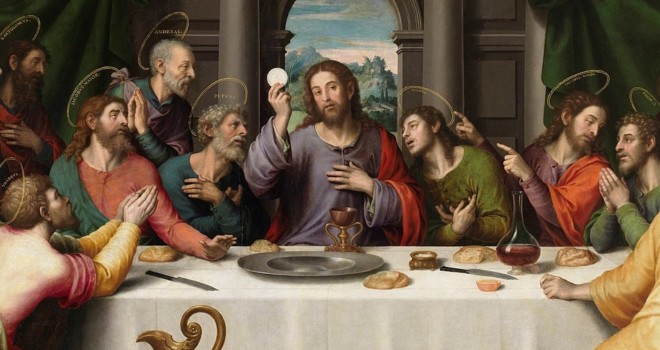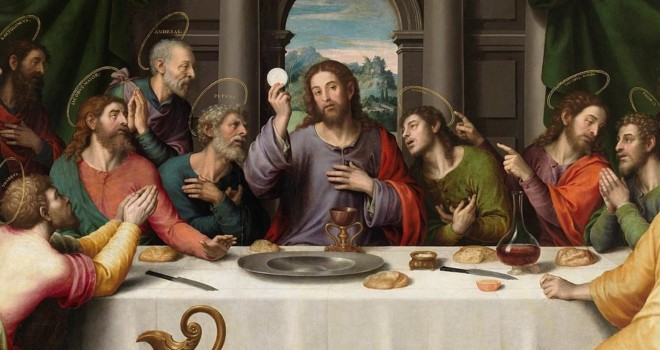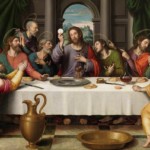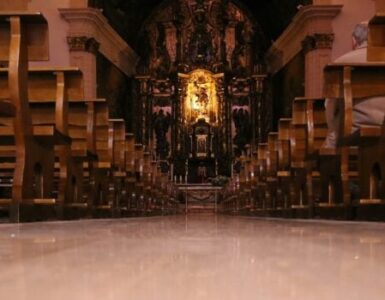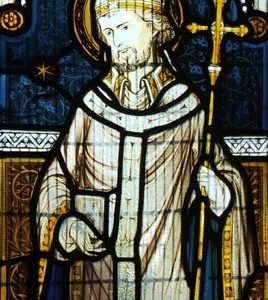God, consider that we do not understand ourselves, and that we do not know what we want, and that we swerve infinitely from what we wish.
Oh, how difficult it is to make this understood by hearts which do not know by experience how sweet is the Lord.
-St. Thérèse of Lisieux
The image of the mustard seed, the smallest of all seeds, which grows into a large tree where the birds of heaven build their nests, can be applied to this mystery manifested during the night between Thursday and Friday.
Twelve frightened men who feel that death is hovering near crowd around the Son of Man whose hand is lifted over a piece of bread and over a cup. Of what value is this gesture, of what use can it be? How futile it seems when already a mob is arming itself with clubs, when in a few hours Jesus will be delivered to the courts, ranked among scoundrels, tortured, disfigured, laughed at by His enemies, pitiable to those who love Him, and shown to be powerless before all.
The Mystery of Holy Thursday
However, this Man condemned to death does not offer any defense; He does nothing but bless the bread and the wine and, with eyes raised, pronounce a few words.
It seems that, after centuries of extraordinary glorification, the small Host for which so many cathedrals have sprung up, the small Host that has rested in millions of breasts and that has found a tabernacle and worshipers even in the desert — it seems that the triumphant Host remains as unknown, as secret as when it appeared for the first time in a room in Jerusalem. Light is in the world as in the days of St. John the Baptist, and the world does not know it.
The debates of philosophers, the disputes of statesmen always lead to religious questions. The point in question is always God and those who believe in Him. An ambitious person must never pronounce the name of Christ if he does not wish to be hated by all. There, where the Prince of this world triumphs [John 12:31], the only obstacle that must be destroyed is Christ. He remains this stumbling block, this stone which, even when it is overturned, is still the cornerstone.
But even those who speak of this stumbling block with hatred and fear do not know anything about it. They are almost as puzzled by this enigma as the chief priests and rulers who ravaged the first church.
The secret of Holy Thursday is spread over the whole world, but nevertheless it remains impenetrable to those outside. One must be of it; one must be incorporated in it; one must be part of the vine; one must be among the branches.
The Secret Borne By Christ
The secret of Holy Thursday was borne by Christ during His mortal life. He was a man like us — of flesh and blood — but, as God, was conscious of His destiny and knew the path He had to walk.
As soon as He had performed
His first miracle at Cana, He doubtless had present in His heart the secret of
the Eucharist. He could change water into wine. He performed this miracle
before all. The water became wine; the wine would become blood. From afar, He
was preparing the minds of men while He disposed their hearts.
How difficult it would have been to tell this secret if He were not God! Not only did the bread and wine become His flesh and blood, but it was necessary that this food be distributed to all those who were hungry and thirsty; it must never be lacking, in order that all might be fed. The two multiplications of bread, performed one after the other, attested again to the omnipotence of Christ. The bread having been multiplied, He would dare at last to pronounce the first words referring to the mystery of Holy Thursday.
Jesus bore the burden of His secret, but each time He confided in His friends they were scandalized: they did not understand.
And when, at last, He unveiled the Passion in precise terms, the disciples were irritated…. What loneliness the living Christ knew then!
It is not when He withdrew into the desert that He felt the greatest loneliness, but when He was in the midst of the flock of those wavering hearts which the Spirit had not yet kindled. Doubtless, it was necessary that the man in Him be reassured by the God so that He would not lose heart when confronted by the infinite disproportion between His message and the poor human race destined to receive it.
However, He did not dedicate Himself to solitude as have so many men of genius. He did not flee from the crowd, but gave Himself up to it. What gives Christ as a man a unique character among the masters of the world is first this gift of Himself, this complete abandonment of Himself to the crowd. Before being delivered, He delivered Himself. He does not belong to Himself, not having come to be served, but to serve. He is the slave of slaves. Nothing belongs to Him. He lives in the street, in the fields, in villages. Miserable bodies affected with leprosy crowd Him, suffocate Him. He seeks refuge in a fishing boat, in order to be able to breathe. Dirty hands grab His cloak; virtue springs from Him.
No one kept less aloof;
no one was ever less guarded, more accessible — such He is still today in the
tabernacle, given up entirely to all — yet nevertheless, He was alone with His
Father, in that mysterious, ineffable union which He sometimes confessed, for
this secret also escaped Him: “No one knows who the Father is, except the Son.”
He
stood alone, without any other witness but Himself of what was accomplished in
His sacred person. Because of His purity He remained isolated in the midst of
the crowd.
“Which of you can convict me of sin?” It is by their passions that men know that they belong to the same race. They all slip in the same direction; they roll down the same slope. How strange this man (who is in their midst and who does not sin) must appear to them!
The greatest saints speak of sin as of a death through which they have passed or, at least, a death that they could have suffered and that threatens them until the end. But Jesus is unaffected by the inclination of the flesh and knows nothing more about sin than the punishment linked to it. Not being able to commit sin, He atones for it.
Are these the speculations of theologians? No. Everything that was accomplished had been announced literally by Isaiah.
And he shall grow up as a tender plant before him and as a root out of a thirsty ground; there is no beauty in him, nor comeliness: and we have seen him and there was no sightliness that we should be desirous of him:
Despised and the most abject of men, a man of sorrows and acquainted with infirmity; and his look was, as it were, hidden and despised, whereupon we esteemed him not.
Surely he hath borne our infirmities and carried our sorrows; and we have thought him, as it were, a leper and as one struck by God and afflicted.
But he was wounded for our iniquities, he was bruised for our sins; the chastisement of our peace was upon him and by his bruises we are healed.
All we like sheep have gone astray, every one hath turned aside into his own way; and the Lord hath laid on him the iniquity of us all.
He was offered because it was his own will and he opened not his mouth; he shall be led as a sheep to the slaughter and shall be dumb as a lamb before his shearer.
By his knowledge shall this my just servant justify many and he shall bear their iniquities.
Therefore, will I distribute to him very many and he shall divide the spoils of the strong because he hath delivered his soul unto death and was reputed with the wicked; and he hath borne the sins of many.
✠
This article is adapted from a chapter in Mauriac’s Holy Thursday: The Night that Changed the World. It is available from Sophia Institute Press.


